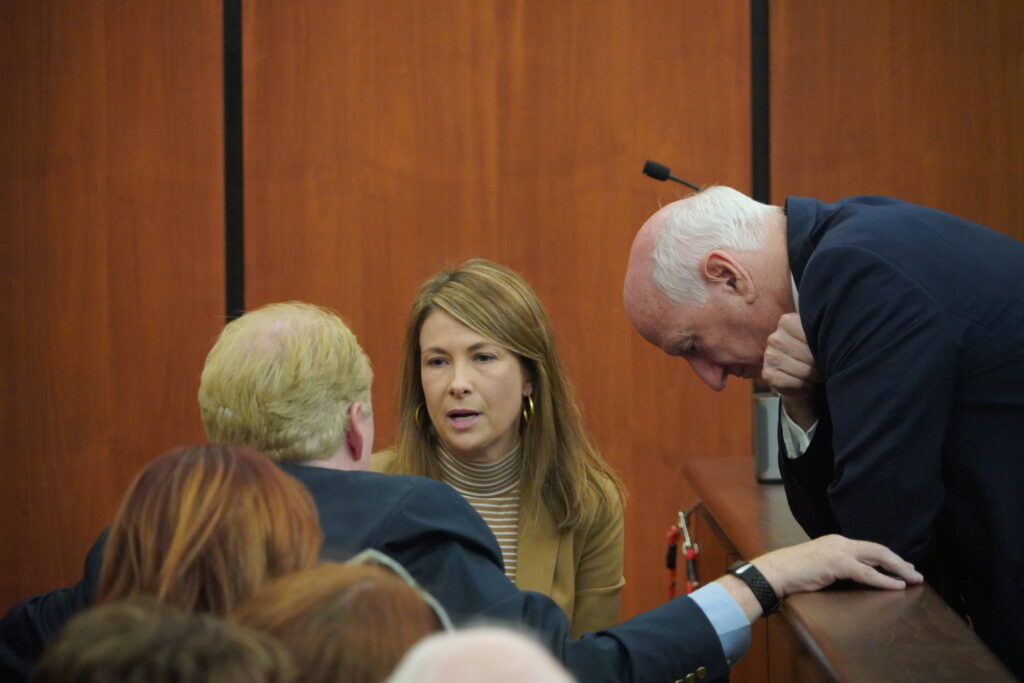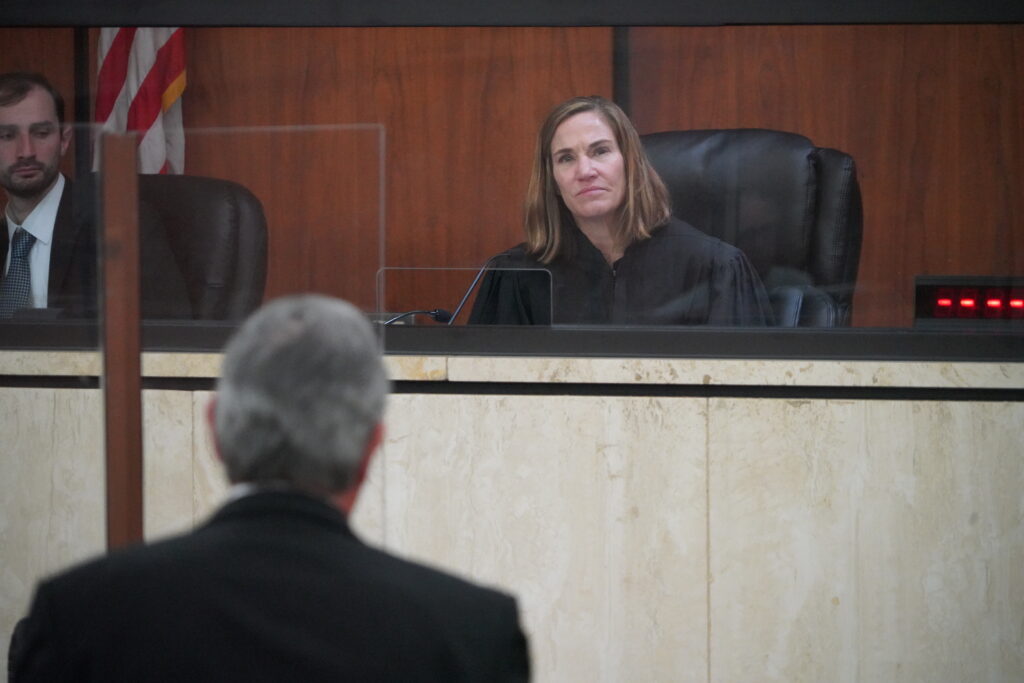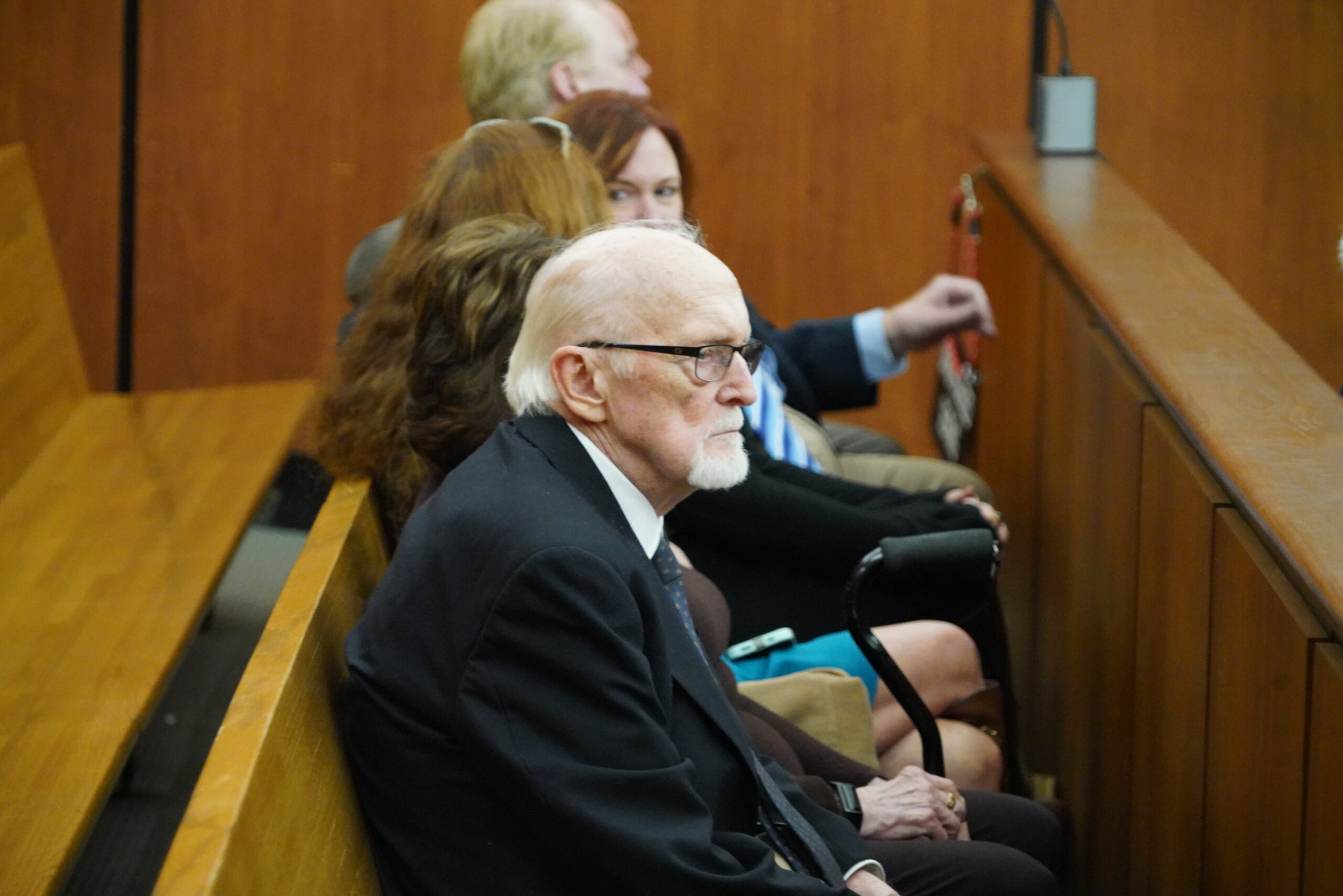The man who ran the most dominant political consulting firm South Carolina has ever seen – prior to his stunning fall from from grace, that is – appeared in court on Friday for a long-awaited hearing tied to allegations that he lied to investigators and obstructed justice in connection with a public corruption investigation linked to his political empire.
Richard Quinn, 77, was accompanied by his family – leaning on a cane and on his wife’s arm – as he slowly made his way into the Richland County courthouse on Friday morning.
Quinn’s hearing was held before Carmen Mullen – a Lowcountry circuit court judge who has become embroiled in numerous scandals in recent years. In fact, Mullen is reportedly among the targets of an ongoing public corruption investigation tied to the ‘Murdaugh Murders’ crime and corruption saga.
Ironically, a hearing for accused killer/ disbarred lawyer Alex Murdaugh was held in the same courthouse on the same day as the Quinn hearing – in an adjacent courtroom.
The investigation at the heart of this hearing, known as “ProbeGate,” revolved around the political empire of Quinn, a “Republican” strategist who amassed unrivaled power and unprecedented influence in the Palmetto State. Well … prior to his stable of pay-to-play politicians becoming the central focus of an investigation into them peddling their influence on behalf of wealthy special interests.
These days, the extent of Quinn’s influence is a closely guarded secret …
Three former legislative leaders with ties to Quinn pleaded guilty to corruption charges and resigned their offices in connection with ProbeGate: Former S.C. Senate president John Courson, former House majority leader Jimmy Merrill and former House majority leader Rick Quinn (Richard Quinn’s son). A fourth legislative leader who was part of the Quinndom – former S.C. House judiciary chairman Jim Harrison – was convicted of perjury and misconduct in office at trial in October of 2018.
“Corporate entities retained Richard Quinn for the purpose of gaining access to and influence over public officials, and by failing to report Quinn’s services, influenced the outcome of legislative matters with no accountability or disclosure to the public,” the grand jurors who investigated ProbeGate wrote in a report released in October of 2018.
Unfortunately, none of those corporate entities were ever held accountable … and the elder Quinn escaped the dragnet with a slap on the wrist. Initially, anyway.
In April 2019, Quinn Sr. was charged with perjury and obstruction of justice in connection with the ProbeGate investigation after he allegedly lied to grand jurors about his role in the scandal. His indictment came just two weeks after my news outlet exclusively reported that he had fallen into a possible “perjury trap” during his April 2018 testimony before a statewide grand jury.

***
Specifically, Quinn is accused of lying to the grand jury about payments and kickbacks made to multiple politicians in his former network – and about money his son received from his consulting firm. He is also accused of lying about political work he performed for elected officials during the course of the investigation – including work for S.C. attorney general Alan Wilson.
S.C. first circuit solicitor David Pascoe was originally responsible for overseeing the criminal cases against the “Quinndom,” but in March 2021 the attorney general referred all remaining criminal cases connected to ProbeGate to S.C. seventh circuit solicitor Barry Barnette. That referral followed a supreme court ruling over disputed prosecutorial powers in the investigation.
Several months later, Barnette re-indicted Quinn.
Quinn Sr.’s attorney, Cindy Crick, argued the indictments leveled against her client last May were “corrupt.” Her rationale? That the supreme court found Pascoe was unauthorized to prosecute Quinn Sr. at the time they were issued.
(Click to view)

(Via: FITSNews/ Will Folks)
Crick (above) also argued Pascoe was not statutorily authorized to bring Quinn in front of the statewide grand jury – referring to his appearance there as an “unauthorized action” as well as a “due process violation.”
“There is no way to fix it,” Crick said. “It cannot be fixed. (The indictment) should be quashed. If we allow a trial to go forward on the basis of testimony that was obtained in violation of a plea deal – by a prosecutor who lacked the authority to bring the charges – then God help us.”
Crick further argued Quinn was immune from prosecution given an agreement reached with Pascoe to provide testimony against other targets of the investigation. This broad agreement was cited in detail by Crick, who expressed incredulity that Pascoe would have extended such a far-ranging offer to Quinn.
“It’s crazy – it is hard to wrap your mind around but that’s what he agreed to,” Crick said.
Barnette responded his office had been empowered with “full prosecutorial discretion” in this case by Wilson.
“In our discretion, we went back before the grand jury,” Barnette said, referring to the charges he re-filed against Quinn last spring.
“He knew what he was agreeing to,” Barnette said, referring to Quinn’s plea agreement with Pascoe. “Perjury is still perjury.”
(Click to view)

(Via: FITSNews/ Dylan Nolan)
Mullen (above) referred to Pascoe’s investigation as an “unbridled check with no oversight” – citing a January 2021 state supreme court decision which concluded the first circuit solicitor lacked the prosecutorial authority to pursue certain ProbeGate indictments.
The decision in South Carolina v. Harrison (.pdf) is what prompted Wilson’s decision to tap Barnette as the new special prosecutor – a move endorsed by Pascoe.
“I asked attorney general Alan Wilson to appoint another prosecutor to the pending cases,” Pascoe told me. “Alan appointed a phenomenal prosecutor in solicitor Barry Barnette. Solicitor Barnette reviewed the cases independently and decided to re-indict (Quinn). I have the utmost confidence that solicitor Barnette will do a fantastic job representing the state.”
Pascoe reiterated Barnette’s argument that Quinn’s alleged perjury had nothing to do with the constitutional debate over his prosecutorial authority.
“You cannot be immune from perjury,” Pascoe said. “People get ‘immunity’ to testify all the time. And they get indicted for perjury if they lie.”
Pascoe also referred back to his statements before the court during the heyday of ProbeGate in which he told Quinn, Sr. that failure to testify truthfully before the grand jury would result in his indictment and prosecution on perjury charges.
“If Mr. Quinn lies to the grand jury, he will be indicted for perjury,” Pascoe said at a December 2017 hearing tied to this case.
Mullen seemed to acknowledge these points – although she framed the issue as one of dueling obligations under the law.
“We cannot have people lie to the grand jury,” Mullen said. “But we also cannot have people dragged to the grand jury by a prosecutor who lacks the authority (to do so).”
Crick’s response? That in a case of competing liberties, the judge should defer to the rights of the accused.
Mullen said she would take the matter under advisement and issue a ruling “sooner rather than later.”
Obviously, count on this news outlet to keep our audience in the loop as to her decision …
***
ABOUT THE AUTHOR…
(Via: Phillippe Randolph Folks)
Will Folks is the founding editor of the news outlet you are currently reading. Prior to founding FITSNews, he served as press secretary to the governor of South Carolina. He lives in the Midlands region of the state with his wife and seven children.
***
WANNA SOUND OFF?
Got something you’d like to say in response to one of our articles? Or an issue you’d like to address proactively? We have an open microphone policy! Submit your letter to the editor (or guest column) via email HERE. Got a tip for a story? CLICK HERE. Got a technical question or a glitch to report? CLICK HERE.


